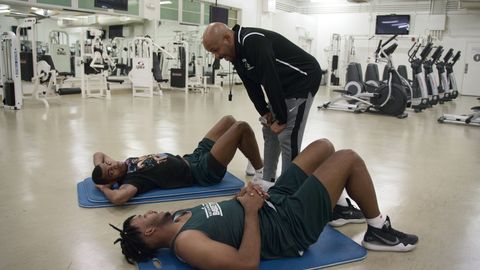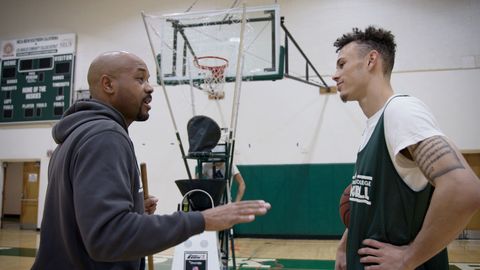This interview contains spoilers for Last Chance U: Basketball.
We all have our stories from a year ago. John Mosley’s starts in a packed locker room, trying to find the words to tell his players that everything they’ve worked for—eight months of driving hours through Los Angeles traffic to get to practice, running till they’d collapse, facing personal demons the whole way through—wasn’t for nothing.
In the final episode of Last Chance U: Basketball, Mosley, the head coach of the East Los Angeles College Huskies, has to break the news to his players that the pandemic officially cut their state championship run short. Not only that, but he has to offer some comfort as a new reality set in for every single person in that locker room, including himself. Mosley, nearing tears himself, says that they’re winners, which isn’t some sports-movie cliché—he’s the kind of guy who wouldn’t say it if he didn’t believe it. He tops it with a hard lesson, reminding them that this is hardly the first instance of incomprehensible pain they’ll face in their lives.
“I was just so panicked,” Mosley told me over the phone this week. “My feeling is like, I’m letting them down. I feel like I was letting them out because I had no control. There was nothing I can do. There’s nothing I can do. I just feel like I let them down.”
In Last Chance U: Basketball, which debuted this Wednesday on Netlflix, Mosley reveals himself as maybe the biggest-hearted (and frankly, most-burdened) coach in the show’s five-year history. As we watch his Huskies chase an elusive championship, Mosley literally mops the floors of his home court, performs something damn near close to an exorcism on his team, and writes a letter to a judge to release a recruit from jail, the big man Joe Hampton. (Whom he mentors into one of the most impressive men we’ve ever seen in Last Chance U, by the way.) Along the way, we watch Mosley teach spin classes, deliver sermons at his church, and try not to go insane as he imagines a hundred different ways to motivate his already near-perfect team.
After Coach Mosley’s epic Last Chance U run, we had to get him on the phone for a postgame interview. Turns out he had a lot to catch us up on—including a heartbreaking moment with his star shooting guard, Deshaun Highler, that didn’t make it into the show.
This content is imported from YouTube. You may be able to find the same content in another format, or you may be able to find more information, at their web site.
ESQUIRE: Coach, how are you doing?
John Mosley: I’m doing well, man. You know what? I actually don’t mind calls from those who I don’t know. I got family calling [after watching Last Chance U] and they’re getting on my case, like, You can’t let that boy scream like that! Just like the old aunts and grannies, who had no idea what I do and they’re watching my whole life and what I do now. It’s so funny, man. I’d rather take calls from you then my aunt, cause she’s on my case a lot.
ESQ: One of the things I loved seeing in the show was you teaching a spin class. Since I feel like everybody watching the show would want to try spinning with you, what’s your secret to teaching a good class?
JM: Man, the music has to be on point. I can be creative and I can make it move. So I mean my class is not a pro class spinning. You have different levels in the class. So I got to keep it right in the middle until I make it a little bit more fun—then super-duper intense. Creating all these moods. Just being creative in the music is what makes it go.
ESQ: You got to make a public playlist on your Spotify so we can all spin along.
Coach: You know what? That’s a good idea. I’ll do that. I actually got tons of playlists—but I got to fix them up a little bit. I got ton of playlists for my old school music. We got Latin music. Some days, I got a Motown mix. The students loved that one.
ESQ: Something else that comes up in the show is all the creative things to keep the team motivated when you’re not really facing much adversity. When do you know if it’s the time to get really fired up and yell, versus the times when you’re really quiet and leave it to them?
JM: You know what? I think it’s the pulse of a lot of good leaders. They’ve asked me about when I walked around for like eight minutes [in silence]. And I know initially in those moments, I just prayed… but it helped me figure out what to do. It’s just a feel, but the only way you can really have that deep feel is if you know they’re individuals that you’re trying to mentor and you try to figure out what you need to do. And that’s learning all of them. Because it could be 15 guys and the last guy who you think can have an impact, he can have an impact to be a detriment to the team. So you got to keep him engaged as well.
ESQ: It really comes off how much you love guys like Joe and Deshaun, who sometimes seem to not always accept your guidance. How do you get people to realize that you love them and won’t give up on them, even if a lot of their lives up to that point have taught them the opposite?
JM: I think because I can talk about some of similar things that I’ve gone through. I’ve seen Joe Hampton. I talk about his basketball, but I’ve seen [young men like] him over and over again. When he’s acting out, I remember acting out that way. I mean, I was a class clown, I was in trouble and I was just that guy, so I had a heart for guys who I got with, because I know there’s a diamond in there. Everybody says, You’re a great coach, a great motivator, you’re a great person. But I wasn’t always that way. And it took a few people. I was fortunate enough to have my father in my life. It took a few people to move me, chip away at the diamond that was in me. And Joe, I could see it there as well. When you see the flashes, when you see that little spark of a diamond under that rock, man, I’m going to get it.
ESQ: It’s like the thing you say in the show, that if you see the person acting like the biggest asshole possible, you need to stop and realize that it’s the person who probably needs the most love at that moment.
JM: The person who deserves it the least, needs it the most.
ESQ: Obviously Last Chance U’s finale two episodes follow your postseason, but it doubles as this incredibly sad documentary about the very last moments before the pandemic. What’s going through your head when the guys are just looking to you to explain it and make sense of it?
JM: Man, it feels like I’m letting them down. The sacrifices [Joe Hampton] made… I didn’t think he was going to make it after two weeks. And he made it… We had guys driving. I think three or four guys, it took them over an hour to get to the campus every day. The guys are running. They’re passing the ball. Playing together. And man, that happens. The whole thing is just built up. It’s all built up. We have to go to the tournament, so everybody gets an opportunity, including guys all the way down to Taj. We were fortunate to get them out and at universities right now. And that’s just a blessing from God. But I was just so panicked. My feeling is like, I’m letting them down. I feel like I was letting them out because I had no control. There was nothing I can do. There’s nothing I can do. I just feel like I let them down.
ESQ: I mean, just from my end watching it, you’re truthful with them. You tell them: “There’s going to be more painful moments in life like this.” Even if it might not have been comforting to them, I feel like that rang true.
JM: Yeah… Who knows if we would’ve won the whole thing or not, but I felt like we got over the hump and we were winners. I truly feel like we were winners. When I said we were winners, I felt like we coordinated, we all figured it out. We figured out a place together. We figured out how to respond the right way and figured out how to be on time, love one another. Figured it all out. We really did. We really figured it out and I do feel OK… I feel like I let them down because I wanted them to taste that plane, saying, “Hey, I’m the best.” But I feel like it was a combination in the weeks prior to that.
ESQ: Since you and the team talk so beautifully about what that season meant to you, what was it watching the season back? Did you feel like you were reliving it?
JM: Oh yeah. It’s even better because it doesn’t bother me at all with what some of the kids said behind my back. I already know that. I’ve been coaching for 20 years. So I know that those things, they were just funny. They’re innocent rebellion, which you can expect as being a coach, a college coach dealing with community college or junior college. So seeing that stuff, just the things that a lot of people had to say about me, my coaching. I mean, all of that was amazing to be able to see. I remember all those moments, and for the show to capture it. I’d say one of my favorite things is the music—it’s just phenomenal to see the story that was told. And it was right on point.
ESQ: Did you have a favorite moment from the show?
JM: I did have a favorite moment. It actually wasn’t on camera. And I think they did a great job [with] our privacy—but we were in San Diego and we had just won a tournament. This was in December, right after Christmas. We were all in a van—all families for some reason got down [there], I think it was vacation. And they are there, all these families. We’re in the van and I looked behind and I’m like, “Where’s Deshaun?” Deshaun’s behind the van. I go back there and I’m like, “Dude, you OK, what’s going on? What happened?” … And he just said, “Coach, I just want to talk to her. I just want to talk to her, coach.” We cried for like 15 minutes about his mom, and then we wiped the tears off and I told him he’s mine forever. And then he gets in the car and he acts like a jerk again.
ESQ: Is there anything specific you’re looking forward to about getting on the court again?
JM: I just want to see the others. I just want to be able to help them. It has nothing to do with basketball. It’s just life skills that I can’t help them with over the phone and over Zoom. And I’m certainly disappointed. I know we have to be safe. I’m just really disappointed. We are treated like stepchildren. Nobody is talking about California community colleges across the country… I’m really burdened and heartbroken. I try to hold back my anger for our leadership, whether it’s our school, whether it’s our district, whether it’s LA County, whether it’s State of California. And try to hold back my anger because it’s very frustrating, because I do what I passionately want to do. And what they truly need, it’s not basketball. Do they need to see me? They need to be here. They need structure and for a whole year, guys like Joe had not had me. I’m beyond frustrated now and it’s turning into anger.
ESQ: When I talked to [Last Chance U Season Five’s head coach] Beam from the last season, he said the same thing. It does seem like a genuine crisis that no one really is paying attention to.
JM: And all they have to do is just find some solution. We’re not asking to play, but let us engage. I can’t even engage them. I’m not even supposed to make contact with the student. That’s wrong.
ESQ: I appreciate you sharing all of that. Is there anything else that you think is important for someone reading this interview to know?
JM: Just watch the show and make sure that we invest in people. I think all of us, even if we’re not the leader of a situation, [can] invest in people, build relationships, and realize what’s going on before we judge somebody. I’ve done it for 20 years now, and if they’re acting out, there’s something going on in their lives. It’s not to figure out what’s going on—it’s to try to help them and not judge.
Join Esquire Select
This content is created and maintained by a third party, and imported onto this page to help users provide their email addresses. You may be able to find more information about this and similar content at piano.io









